 |
|||||||||||||||||
|
Patient Resources/FAQ
When should my child first see the dentist? From the time children first visit us until they graduate from our practice as young adults, our goals are to give them a healthy smile, create a positive attitude toward dental hygiene, and help them develop a proactive approach to dental care that will continue throughout their lifetime. If you have questions about the frequency, focus, or outcomes of early dental care and prevention, please call our office at (517) 339-0040. Remember, we're here to help – so don't hesitate to contact us for clarification or additional information. How should I prepare my child for a first dental visit?Whether it's a routine dental appointment or an appointment involving dental treatment, PLEASE be positive, supportive, and encouraging when interacting with your child. Just how do you do that? If your child asks questions, respond with simple answers. For example… Q: What will the dentist do? A: Count your teeth. Q: How will she do that? A: With a light and tiny mirror. Keep in mind that Dr. Melissa and her staff will explain all procedures to your child prior to treatment in a way that is both understandable and positive. One word of caution: Please do not talk about unpleasant dental care experiences in front of your child as doing so can often create unnecessary anxieties that are difficult to overcome. If you anticipate a positive experience for your child at our practice, it's much more likely he or she will expect a positive adventure, too! NEW PATIENT FORMS/HIPPA/Privacy PracticesSHOULD THE PARENT "COME IN?" After helping to get your child comfortable in the treatment area, Dr. Melissa may ask you to leave for a short time during treatment. This enables her to communicate one-on-one with your child and establish the trust needed to create a positive attitude toward dental care and treatment. You will be welcomed back to the treatment area as soon as treatment is completed. STERILIZATION/DISINFECTIONBefore your child enters the treatment room, the dental unit and chair are cleaned and disinfected with antimicrobial chemicals approved by the U.S. Government. All dental instrumentals are either sterilized or disinfected, depending on the type of materials involved. All instruments that can stand high heat are first cleaned and then sterilized using one of several proven high-heat methods. The few items that cannot be heat sterilized or disposed of after treatment are first cleaned and then disinfected with special, high-level chemical disinfectants. Both methods are approved by the Centers for Disease Control and the American Dental Association (ADA). TREATMENT OPTIONS/SEDATIONDuring treatment, it's important your child be able to remain still in order to allow us to provide care in a safe and comfortable way. If your child is unable to sit still or cannot follow instructions, the quality of dental care may be compromised. In those situations, we offer several sedation options that will result in a more positive dental experience for your child. For routine treatment, we typically use a combination of topical anesthetic, local anesthetic, and occasionally nitrous oxide oxygen analgesia. With toddlers, we sometimes use light sedation to make them more comfortable. This sedation option will be explained to you before it is administered to your child. NOTE: We do not administer general anesthesia in the office. If a child requires a general anesthetic (i.e., the child is "put to sleep"), Dr. Melissa would provide the treatment in a hospital surgical center. WHAT ABOUT X-RAYS?This valuable diagnostic tool is used in trauma situations and to locate hidden decay, infections, bony abnormalities, and delayed or un-erupted teeth. For her diagnostic needs, Dr. Melissa relies on digital radiography, a state-of-the-art x-ray technology that utilizes a fraction of the radiation used by older x-ray systems. SCHEDULE AN APPOINTMENT When a conflict arises and you must reschedule your appointment with us, we ask for the courtesy of 48 hours notice. Please be aware there is a fee for a missed or late-cancel appointment when we do not receive 24 hours notice. We do try to provide you with a courtesy call to remind you of your child's appointment. However the responsibility of remembering your appointment is still yours regardless of whether or not we are able to reach you with a reminder call. Please call us if your plans change. THANK YOU! CONTACT USINSURANCEOur practice is a fee-for-service pediatric dental practice. Most insurance companies only pay a portion of the fees incurred. We require that your balance for each procedure be paid at the time of treatment. We do work with most kinds of private dental insurance companies. We participate Delta Dental and work with them to maximize your insurance reimbursement for covered procedures. If you do not have dental insurance, payment of all dental fees are expected to be made at the time services are rendered. Please remember to bring your insurance information with you. Although we will always try to assist you with insurance issues, it is your responsibility to understand your insurance policy and interact accordingly with your insurance provider. PAYMENTFor your convenience, we accept personal checks, MasterCard, and Visa.While we can not assume responsibility for payments by the insurance carrier, we will be happy to assist you with any communications with the company. Upon request, prior to treatment, we can give you an estimate of what your insurance may pay and an estimate of your portion; you will be expected to pay your portion at each visit. Note that dental insurance rarely covers 100% of dental fees. When insurance payment is not received after 60 days, the insurance balance becomes your responsibility. In all cases, including divorce, the adult who brings the child to their dental appointment is responsible for payment at the time care and treatment is provided. HOSPITAL TREATMENTIf your child requires treatment in a hospital setting, we will ask you for your medical insurance information. While we do not bill the medical insurance, the hospital and anesthesiologist usually require preauthorization prior to scheduling. WHAT IS A PEDIATRIC DENTIST? Dr. Melissa has created a practice to fit your child's needs from infancy through adolescence. WHAT IS PREVENTIVE DENTISTRY? Dr. Melissa and her staff are concerned about your child's total health care. And good oral health is an important part of total health. Establishing us as your child's "dental home" gives us the opportunity to help you implement preventive dental health habits and keep your child at low risk for dental/oral disease. Our focus will be on providing you and your child with information about proper oral hygiene, counseling you on proper nutrition and diet, and working with you to keep your child free of decay. If there is early detection of decay or dental diseases, Dr. Melissa is highly qualified to provide care to your child. Not only does she keep current on research and new advances in dentistry for children, she teaches advanced dental concepts at one of the most prestigious dental schools in the country. PREVENTION BEGINS EVEN BEFORE BABY IS BORN
A baby's primary teeth and permanent teeth are developing before birth. A mother's nutrition and exercise, as well as her own oral health, impact her child at birth and beyond. PREVENTION AFTER YOUR BABY IS BORN
It's also important to know that when a mother or caregiver has decay or a lot of oral bacteria, the baby or child is at a higher risk of decay. Dental caries is a transmissible and infectious bacterial disease. Four things are necessary for cavities to form: 1) a susceptible tooth, 2) "bad" bacteria, 3) frequency of sugars or other carbohydrates, and 4) time. We can instruct you how to make teeth strong, keep bacteria from organizing into harmful colonies, develop healthy eating habits, and understand the role that time plays. Remember dental decay is an infection of the tooth. Visiting us early can help you avoid unnecessary cavities and dental treatment. PEDIATRIC DENTAL CARE INFANTS: 0-2 YRS OLD
During your child's infant oral-health examination, Dr. Melissa will need your help. She uses a knee-to-knee exam that keeps your baby in your lap where she or he can feel safe and secure. Your child faces you but lays his or her head down in Dr. Melissa's lap -- where she can examine your child's teeth, tongue, lips, and throat. Based on your child's exam, diet, oral hygiene, fluoride levels, and oral habits, Dr. Melissa will then determine the right guidance or treatment plan for your child's specific needs. It's also a great time for you to ask questions of Dr. Melissa! A healthy mouth has no cavities, no gingival or periodontal disease and has no mal-occlusions (bad bite) PEDIATRIC DENTAL CARE FOR CHILDREN 3-6 YEARS OLD Did you know your child's baby teeth are very important? Of course, they will eventually fall out and be replaced by permanent teeth. However, until then the baby teeth are important in chewing, biting, proper speech development, and appearance. The baby teeth also help guide and hold space for the permanent teeth. Keeping your child's teeth healthy until they naturally fall out may help prevent orthodontic appliances and crooked permanent teeth. To give your child a healthy, beautiful smile, we encourage you to enforce a healthy diet, assist in or do your child's daily brushing and flossing, and see Dr. Melissa every six months for a dental checkup. A healthy mouth has no cavities, no gingival or periodontal disease and has no mal-occlusions (bad bite)
Here's what we do during your child's six-month checkup. First, we'll review and update your child's medical history. Then we'll provide a professional cleaning to remove plaque, tartar, and stains which may lead to cavities and gum disease. Lastly, we'll apply a topical fluoride treatment to strengthen enamel and protect your child's teeth against decay. Digital dental radiographs (x-rays) will be taken if necessary. See Dental Radiographs. Dr. Melissa will also perform an oral examination of your child's teeth and soft tissues, as well as evaluate your child's bite and jaw development. At this time, she will discuss radiographic results (if necessary), diet, oral hygiene, and fluoride levels with you. She will also take this opportunity to review with you any of your child's special dental needs. PEDIATRIC DENTAL CARE FOR ADOLESCENTS/PRE TEEN 7-14 YRS OLD
Yes, kids (like their parents!) are having physical, emotional, and social experiences at this point in their lives that can have a negative effect on oral health. Adolescents are eating differently (on-the-run, fast foods), snacking more frequently, consuming more soft drinks and power drinks, failing to brush and floss, and also undergoing hormonal changes. Children who maintain good oral hygiene throughout their teen years are more likely to continue brushing and flossing as adults than are children who aren't taught proper oral care. It's important to remember that good and poor oral hygiene behavioral patterns are being established during these all-important adolescent years. We strongly encourage you to continue to enforce healthy eating and brushing habits at home. Adolescence is a good time to let your child learn to brush more on his or her own -- but with appropriate supervision. If your child has poor oral health habits, work with him or her to change them now. It's much easier to modify habits in a child than in an adult. Plus, a healthy smile, strong teeth, and good breath all contribute to a young person's sense of personal appearance, confidence, and self esteem. Stay involved with your child's oral hygiene and know what to look for so you can tell if good oral health is being maintained. It's important to not only look for "dirty" teeth, but check for signs of periodontal disease such as bleeding gums, swollen and bright red gums, gums that are receding away from the teeth, and bad breath. If necessary, Dr. Melissa can provide you with additional information regarding sealants, missing teeth, and wisdom teeth, and also counsel you and your child on the impact of oral piercings and tobacco use. A healthy mouth has no decay, no gingival or periodontal disease and has no mal occlusions (bad bite) At your adolescent's six-month check up, we'll review and update his or her medical history. We'll provide a professional cleaning to remove plaque and stains which may lead to cavities and gum disease, and also remove tartar and calculus that appears above the gum line. (Tartar is hardened plaque that no longer can be brushed away.) Digital dental radiographs (x-rays) will be taken if necessary. At this time we will also provide an application of topical fluoride to strengthen enamel and protect your child's teeth against decay. Dr. Melissa will also perform an examination of your child's teeth and soft tissues, and evaluate his or her bite, jaw development, radiographic results (if necessary), diet, fluoride levels, and overall oral hygiene. She will also review and discuss your child's specific needs with you, particularly issues related to bite and jaw development. This is important because, if needed, early orthodontic treatment may prevent extensive orthodontic work in the future. Even as early as seven years of age, children may need a referral to an orthodontist to address specific issues of concern. EARLY ORTHODONTICS
When treatment is begun early, Dr. Melissa can accomplish the following:
A healthy mouth has no decay, no gingival or periodontal disease and has no mal-occlusions (bad bite) Do you have questions about pediatric dentistry or are you interested in learning more about your child's teeth and oral health? The following sites will provide you with useful information and valuable insight.
EMERGENCIES Q. How does your office handle emergencies? Q. What should I do if my child's has a baby tooth knocked out? Q. What should I do if my child's has a permanent tooth knocked out?
Q. What should I do if my child's has a baby tooth or permanent tooth chipped or fractured?
Q. What do I do if my child has a toothache? Post-Treatment of ExtractionsBleeding Swelling Space Maintainers Discomfort after cementation Loose appliance Teeth are coming in Fillings and Crowns Pain Swelling Lip Biting After TreatmentOften children will bite themselves in the area they were anesthetized without realizing it. The immediate area may become quite swollen and painful. Your child will need to remain on a soft diet until the area heals to avoid re-injuring themselves. Give Children's Motrin/Tylenol as needed for the pain. Apply ice or cold compresses to swollen areas. Stomach Aches after CleaningsDuring your child's dental cleaning, fluoride was placed on his or her teeth to help strengthen the enamel. Fluoride is irritating to the stomach if swallowed, and your child may have swallowed a small amount of fluoride during treatment. You can give your child a glass of milk to help neutralize the fluoride and minimize stomach pain.
|
 |
|||||||||||||||
 |
|||||||||||||||||

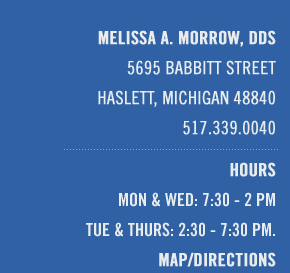
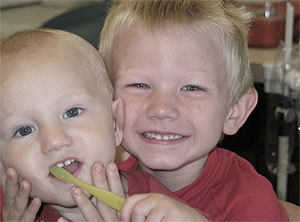 Your child should see Dr. Melissa for a routine dental examination when his or her first tooth appears (age 6 months to one year) or by the first birthday. Although it may seem premature, we recommend this early visit because childhood decay can occur quickly due to several dietary, behavioral, and clinical factors. Taking a proactive approach will help you protect your child from serious problems before they occur. This preventative strategy is endorsed by the American Academy of Pediatric Dentristy, the American Academy of Pediatrics, and Bright Futures.
Your child should see Dr. Melissa for a routine dental examination when his or her first tooth appears (age 6 months to one year) or by the first birthday. Although it may seem premature, we recommend this early visit because childhood decay can occur quickly due to several dietary, behavioral, and clinical factors. Taking a proactive approach will help you protect your child from serious problems before they occur. This preventative strategy is endorsed by the American Academy of Pediatric Dentristy, the American Academy of Pediatrics, and Bright Futures.  We recommend you avoid providing any detailed explanation about an upcoming dental visit, particularly if your child is very young. The less fuss and the less said the better. This is particularly true if YOU are nervous about the appointment -- as it will be difficult to hide your anxiety from your child. Simply say "We are going to the dentist" and leave any further explanation to Dr. Melissa and her staff. For children age 3-8, we encourage you to use books and videos to communicate that going to the dentist is part of growing up. Your local library and most bookstores have numerous resources available on the subject.
We recommend you avoid providing any detailed explanation about an upcoming dental visit, particularly if your child is very young. The less fuss and the less said the better. This is particularly true if YOU are nervous about the appointment -- as it will be difficult to hide your anxiety from your child. Simply say "We are going to the dentist" and leave any further explanation to Dr. Melissa and her staff. For children age 3-8, we encourage you to use books and videos to communicate that going to the dentist is part of growing up. Your local library and most bookstores have numerous resources available on the subject. 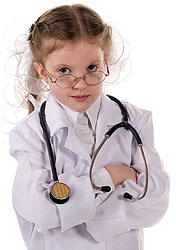 On your child's first visit - and in subsequent routine dental care appointments - you will typically be invited into the treatment area.We believe parents play an important role in the prevention of dental disease among children – so we consider YOU to be an integral part of our TEAM. In fact, don't be surprised if we ask for your help during your child's visit to our office.
On your child's first visit - and in subsequent routine dental care appointments - you will typically be invited into the treatment area.We believe parents play an important role in the prevention of dental disease among children – so we consider YOU to be an integral part of our TEAM. In fact, don't be surprised if we ask for your help during your child's visit to our office. 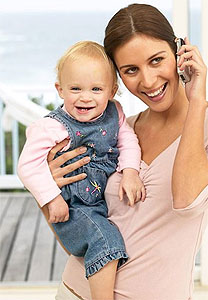 When you are on time, it helps us be on time! But we also realize there will be times when you arrive late to your appointment. When that happens, we will make every effort to see your child based on our schedule. However, every family has an appointment reserved for them -- just like you. So in some instances we may need to reschedule your appointment to be fair to other families who have arrived on time.
When you are on time, it helps us be on time! But we also realize there will be times when you arrive late to your appointment. When that happens, we will make every effort to see your child based on our schedule. However, every family has an appointment reserved for them -- just like you. So in some instances we may need to reschedule your appointment to be fair to other families who have arrived on time.  "Pediatric dentists are the pediatricians of dentistry" -- according to the American Academy of Pediatric Dentistry. A pediatric dentist specializes in the dental health care of infants, adolescents, and children with special needs. By virtue of two to three years of specialty education and experience following dental school, a pediatric dentist is uniquely qualified to handle special issues and challenges associated with the care of children. In Michigan, a pediatric dentist is required to hold a dental license and a specialty license. Many parents choose a pediatric dentist even though their children have no special dental problems, much as they would choose a pediatrician for their child rather than a family doctor.
"Pediatric dentists are the pediatricians of dentistry" -- according to the American Academy of Pediatric Dentistry. A pediatric dentist specializes in the dental health care of infants, adolescents, and children with special needs. By virtue of two to three years of specialty education and experience following dental school, a pediatric dentist is uniquely qualified to handle special issues and challenges associated with the care of children. In Michigan, a pediatric dentist is required to hold a dental license and a specialty license. Many parents choose a pediatric dentist even though their children have no special dental problems, much as they would choose a pediatrician for their child rather than a family doctor. Prevention is much better than treatment - for your child and for you as a parent. When your child remains cavity free, visits to the dentist are more positive and rewarding. And when there are no cavities (Yea!), there are fewer expenses for you as a parent. Preventive dentistry involves not only routine dental checkups but good, consistent, home-care brushing habits and healthy nutrition.
Prevention is much better than treatment - for your child and for you as a parent. When your child remains cavity free, visits to the dentist are more positive and rewarding. And when there are no cavities (Yea!), there are fewer expenses for you as a parent. Preventive dentistry involves not only routine dental checkups but good, consistent, home-care brushing habits and healthy nutrition.  Did you know that cavities are caused by germs that are passed from adult to child? Yes, babies are born without the bacteria (germs) that cause cavities. Babies get these germs from saliva that is passed from their caregiver's mouth to their own.
Did you know that cavities are caused by germs that are passed from adult to child? Yes, babies are born without the bacteria (germs) that cause cavities. Babies get these germs from saliva that is passed from their caregiver's mouth to their own.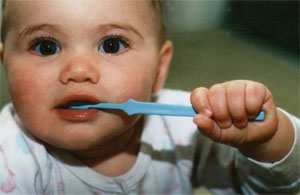 Preventive dentistry is the proper habit and practice of brushing and flossing at least two times a day for the child and the mother/father or caregiver. The fact is we all have bacteria in our mouth. The key is to keep the levels low. Why? While decay does not spread from tooth to tooth, the bacteria that cause decay attach to the teeth and thrive and multiply within the plaque. The bacteria use sugar to produce acid. When there is enough bacterial acid coating the tooth surface potential for additional decay occurs.
Preventive dentistry is the proper habit and practice of brushing and flossing at least two times a day for the child and the mother/father or caregiver. The fact is we all have bacteria in our mouth. The key is to keep the levels low. Why? While decay does not spread from tooth to tooth, the bacteria that cause decay attach to the teeth and thrive and multiply within the plaque. The bacteria use sugar to produce acid. When there is enough bacterial acid coating the tooth surface potential for additional decay occurs. 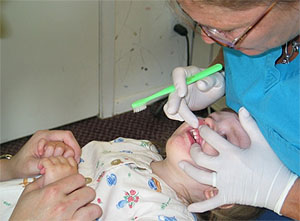 Did you know your child should start routine checkups by the time he or she is 12 months old? Yes, the ideal time to start routine checkups with a pediatric dentist is when a child's first tooth erupts (between 6 months to 12 months old) or their first birthday. The American Academy of Pediatric Dentistry (AAPD.org) has additional information on starting a "dental home." We encourage you to give your child this early visit because childhood decay can happen very quickly due to many factors. It is important to prevent a problem with early diagnosis and treatment (if necessary). It's important for you to know you can decrease your infant's risk for decay by keeping his or her tongue, cheeks, and gum pads clean after feedings. Also, a soft bristle, small-head tooth brush or wet wash cloth works great!
Did you know your child should start routine checkups by the time he or she is 12 months old? Yes, the ideal time to start routine checkups with a pediatric dentist is when a child's first tooth erupts (between 6 months to 12 months old) or their first birthday. The American Academy of Pediatric Dentistry (AAPD.org) has additional information on starting a "dental home." We encourage you to give your child this early visit because childhood decay can happen very quickly due to many factors. It is important to prevent a problem with early diagnosis and treatment (if necessary). It's important for you to know you can decrease your infant's risk for decay by keeping his or her tongue, cheeks, and gum pads clean after feedings. Also, a soft bristle, small-head tooth brush or wet wash cloth works great! By age 2-3, all of your child's baby teeth should appear. It's also a time when we hope your child has had routine dental care every six months.
By age 2-3, all of your child's baby teeth should appear. It's also a time when we hope your child has had routine dental care every six months. 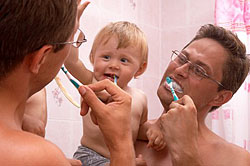 We encourage you to be a dental role model for your child by practicing good oral health care habits. Be sure to schedule regular dental check-ups, periodontal evaluations, and cleanings for yourself. Children learn from what they see you do!
We encourage you to be a dental role model for your child by practicing good oral health care habits. Be sure to schedule regular dental check-ups, periodontal evaluations, and cleanings for yourself. Children learn from what they see you do!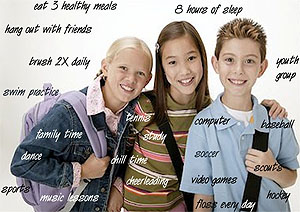 Between the ages of 7-14, children lose their baby teeth and obtain their adult permanent teeth.
Between the ages of 7-14, children lose their baby teeth and obtain their adult permanent teeth.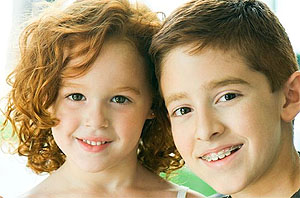 From age 6 - 7 your child's mouth continues to change, grow, and develop. Baby teeth begin to be exchanged for permanent incisors, and the first permanent molars usually arrive. Cross bites, crowding, and other problems can be evaluated at this time.
From age 6 - 7 your child's mouth continues to change, grow, and develop. Baby teeth begin to be exchanged for permanent incisors, and the first permanent molars usually arrive. Cross bites, crowding, and other problems can be evaluated at this time.